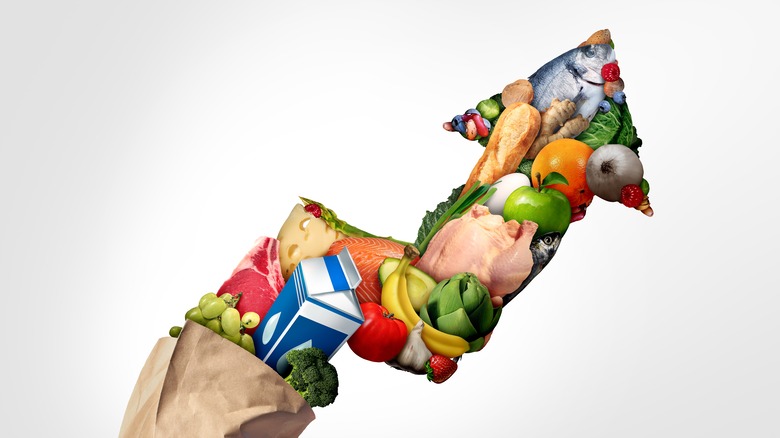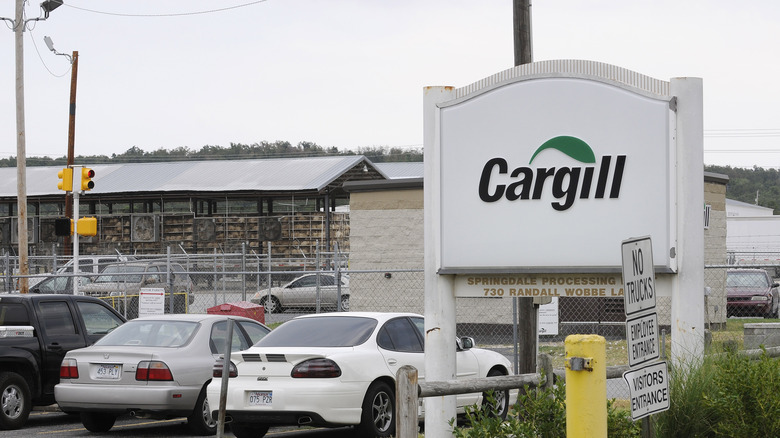Why Breakfast Is Being Devastated By Inflation
The equity markets cheered when the news came out on Wednesday, per Reuters, which showed that the measures the Federal Reserve was taking were finally starting to work. Data showed that inflation as a whole had declined — and instead of setting another 40-year inflation record we did in June, the Consumer Price Index or CPI actually was flat and remained unchanged, per NBC News. It was, in the words of Principal Global Investors chief global strategist Seema Shah, "All-out positive for consumers."
However, there was a "but." In revealing the good news that the July CPI was flat at 0%, the Bureau of Labor Statistics also said food prices had actually risen 1.1% in July for the seventh monthly increase of 0.9% or more. The cost of coffee rose by 3.5%, representing the highest increase, while the cost of meat, poultry, fish, and eggs rose by half a percent after dropping in June. On the whole, the Bureau's food at home index actually went up by 13.1%. "Households will unfortunately continue to feel the severe strain of elevated price pressures on their budgets," Shah told NBC.
How our breakfast has fallen victim to inflation
Leading the price increases is a breakfast staple. Eggs have gotten more expensive and prices skyrocketed 38% when compared to last year, per CBS. Flour prices rose 22.7% over the last 12 months as did chicken, which now costs 17.6% more; milk is 15.6% more expensive; while fruits and vegetables are 9.3% pricier than they were 12 months ago. As a result, we're paying much more for breakfast today than we were this time a year ago, thanks to collective increases in the prices of coffee, flour, dairy, and eggs. Other than the cost of feed, another reason why eggs have been so expensive: A bird flu outbreak caused the deaths of 36 million chickens and turkeys, per Vox.
While the Federal Reserve has been trying hard to control inflation by raising interest rates, getting food inflation under control is a bit more complicated, because we all still have to eat, regardless of the cost. Still, CBS says inflation is affecting spending habits and consumers are cutting costs where they can; for instance, Tyson says people are choosing to eat less steak and more chicken, while groceries are reporting an uptick in demand for private brands.
Meat processor Cargill still made a record profit
But on the global front, the United Nations' Food and Agriculture Organization (FAO) reported a drop in the FAO Food Price Index for July, the fourth month in a row. The Index registered what the FAO said was the steepest monthly decline since October 2008, thanks to a retreat in vegetable oil and cereal prices.
It might thrill no one to know that Cargill, one of the biggest beef processors in North America, and now part-owner of the United States' third biggest chicken producer, Sanderson Farms, reported a record annual revenue of $165 billion, per BNN Bloomberg. Reuters says its earnings rose 23% on the back of "high farm products prices and robust global demand."
It may be no accident that Cargill is reporting record earnings amid inflation. In May, University of Massachusetts economist Isabella Weber said, "Outsize price hikes are at least partially responsible for inflation. Companies have bragged about how they have managed to be ahead of the inflation curve, how they have managed to jack up prices more than their costs and as a result have delivered these record profits," per Forbes.


